Just get on with it: the adventure of entrepreneurship
An office job in the civil service is no longer the only career option for young people in Chad. A rapidly growing group of young people are opting to start their own business. Running a small business is not only a way to earn money, it also builds confidence and helps young people to break free of le système. ‘Don’t wait, just get on with it!’
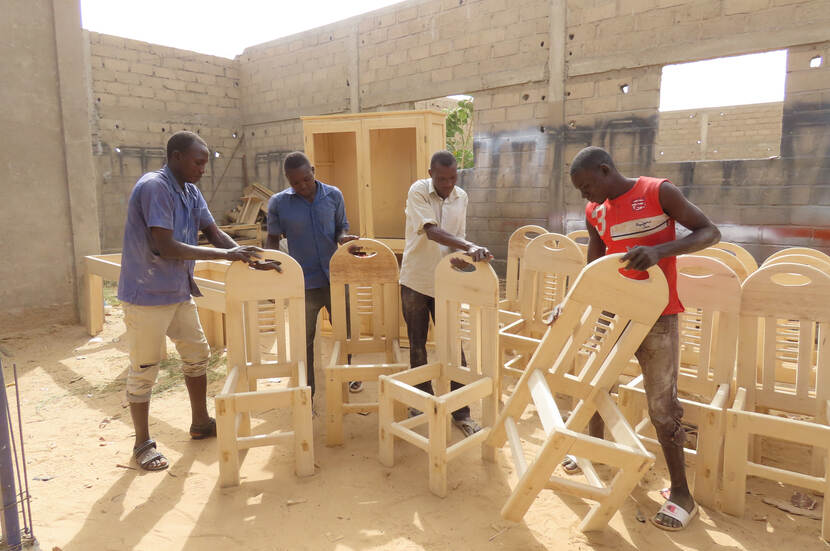
Sandrine Ousmane (34) often works long days, going to homes and businesses from early in the morning to late in the evening to sell freshly-squeezed fruit juices. ‘I have a range of flavours – mango, lychee, ginger – depending on the season,’ she says.
She runs her company, Le Mbakeur, single-handedly. This makes her unusual in Chad, where young women are not very likely to start their own business after graduation. So Sandrine’s relatives did not all receive the news that she planned to become an entrepreneur with unreserved enthusiasm. ‘They thought I was wasting my time,’ she tells me on a Zoom call from the capital Ndjamena.
Clément Madjita, aged 29, is on the same Zoom call. He too chose to take the entrepreneurial route. As director of Mar’One he runs an events venue and restaurant which people can hire for weddings, religious celebrations and student parties. His family was also mystified at first.
‘My parents didn’t understand,’ he says. ‘They expected me to get a normal job after I graduated; an office job, in other words.’ In Chad, young people and their parents regard an administrative job, preferably in a government office, as the best way of earning a stable living.
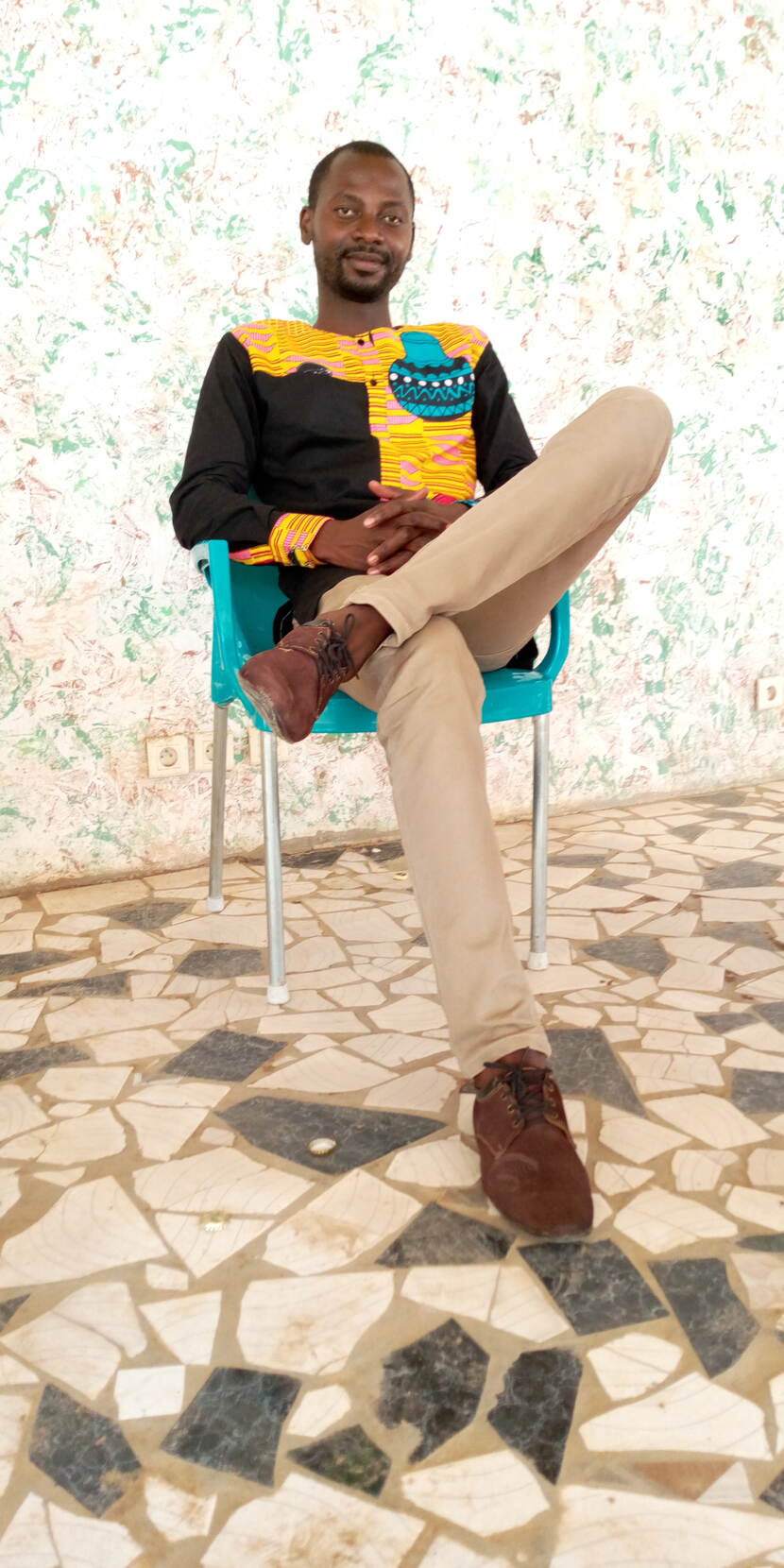
The tendency to play it safe is quite understandable, of course. Chadians have faced a toxic mix of problems for some time now. Half the population lives below the poverty line, and the country is highly dependent on foreign aid.
The oil reserves discovered there in the 1970s should have been a source of national income, but the revenues have largely gone into the pockets of Western companies like ExxonMobil and Shell. Chad scores high on international corruption indices, and comes bottom of the UN’s Human Development Index.
The population is growing rapidly. In the early 1990s Chad had six million inhabitants; now, the figure stands at over 16 million, and 60% of them are under the age of 25. Finding a job is one of the biggest challenges facing young people in Chad.
According to figures from the International Labour Organization, youth unemployment in the country’s urban areas was already running at 30% before the pandemic. ‘The current mindset among young people,’ Madjita explains, ‘is that you have to find a job in the public sector. But there’s often not enough work there.’
Bold move
This attitude is now changing. Young Chadians are starting to broaden their horizons, and see startups and running their own business as a way of escaping poverty. Ousmane and Madjita regard themselves as pioneers, but they see more and more young people trying their luck in the world of business.
This requires creativity, of course, although potential entrepreneurs don’t necessarily have to come up with groundbreaking ideas in order to be successful. ‘My plan,’ says Ousmane, ‘was actually quite a logical one. It’s very hot here all year round, so I thought there would be a market for refreshing fruit juices.’
You need to be willing to take risks, says Madjita. His enterprising nature became clear quite early on when, as a child, he would sell bottles of fuel door-to-door in his neighbourhood. After his studies, Madjita went to work for the company that he later bought.
It was a bold move. ‘At that point the company was about to close down.’ Though his friends and family were initially sceptical, he is now admired as a success. ‘The people around me are all really proud.’ he says.
‘Chad is really lagging behind’
There is growing interest in entrepreneurship, but the sector is still in its infancy. In 2019 the then organiser of Global Entrepreneurship Week in Chad told Reuters news agency that the country still had some catching up to do, particularly compared to the rest of the continent. ‘Chad is really lagging behind.’
The subject did not really attract much attention until about four years earlier, he explained, when ‘startup hubs’ were already quite common in other African countries. Madjita and Ousmane say that one of the biggest obstacles is the inadequate education system. ‘Everything’s focused on getting as many qualifications as possible,’ Ousmane complains.
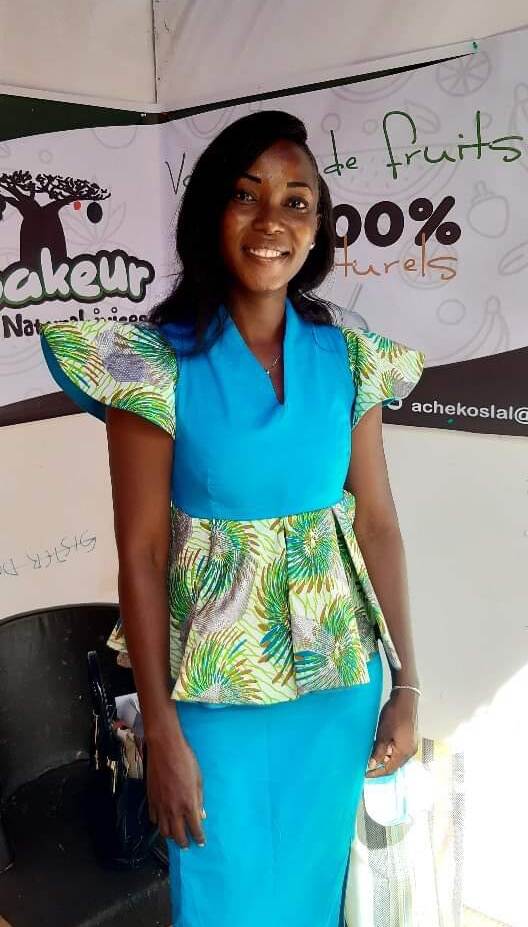
After completing their education many young Chadians discover that the qualification they worked so hard to obtain is fairly useless on the job market. Madjita is particularly critical of the education system in Chad: ‘What we learn has absolutely nothing to do with the reality here.’
Ousmane nods and adds: ‘There’s absolutely no focus on entrepreneurship at school. They don’t teach you how to do business deals, how to behave professionally, how to successfully market products.’
When they started out as entrepreneurs, it was basically all up to them. Now they get support from Job Booster, an initiative launched by Dutch international development organization Woord en Daad. The programme aims to bring young people into contact with employers, or to help them run their own business.
‘I heard about Job Booster on radio FM Liberté, a local radio station in Ndjamena,’ says Madjita. He and Ousmane are learning how to keep their books, and how to devise a good business strategy. ‘We also each have our own business coach.’
‘Equity is an alien concept here’
Hal Souakar Ambera (34) is one of the coordinators of the Job Booster programme in Chad. ‘It really got going in 2019 – but it was followed just a few months later by the first lockdown,’ he tells me on Zoom. ‘Almost the entire country closed down, which made it extra difficult for young people to find work.’
The COVID-19 pandemic and the measures introduced in response had a huge impact. The parliamentary committee on economics and planning did not waste any time: the pandemic had ‘exposed the bankruptcy of the Chadian economy’. Chad had to ask the IMF for a 560 million dollar loan.
The government has now also come to the conclusion that it can be beneficial to promote independent entrepreneurship among young people, says Ambera. Last year it established a fund around 30 billion CFA francs (or €45 million) that can be disbursed as loans to young entrepreneurs. The proposal was unanimously adopted by parliament.
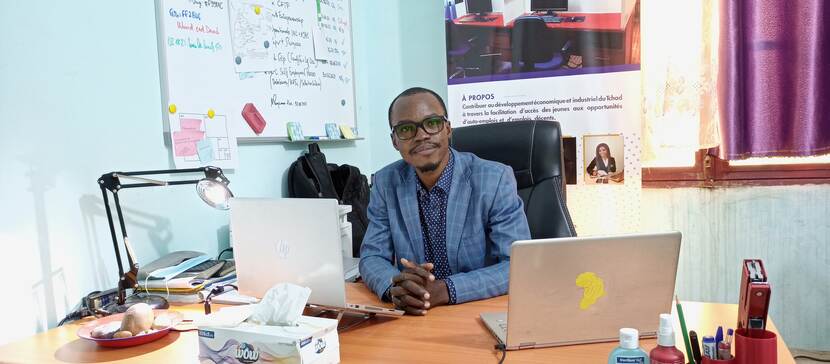
‘The then president began talking increasingly about the importance of entrepreneurship,’ says Ambera. It’s now a hot topic at all government ministries.
He is however concerned about whether the money really will reach young people. ‘In practice you often see that plans like this are poorly implemented. There’s a lot of corruption here.’ The lack of good governance is partly down to clientelism and tensions between different ethnic groups and regions, he explains. ‘Equity is an alien concept here.’
Violence
In April President Idriss Déby was shot dead just after his re-election. He had been leading his army against rebel groups in the northwest of the country. His son, General Mahamat Déby, seized power and is currently the de facto leader.
‘The day the president was murdered,’ says Ambera, ‘we couldn’t go to the office, so we worked at home. There were soldiers in all the streets.’ Idriss Déby had been president for 30 years, and was known for favouring his fellow party and clan members in the national administration. ‘That caused a lot of bad feeling among the rest of the population.’
In the Middle Ages Chad was a hub of trans-Saharan trade. Like other countries in the region, it lies at a cultural crossroads, with the largely Muslim north influenced by Arabic culture, while Christianity is the main religion among the black Africans in the south. Chad may once have been a trading hub, but ‘now foreign investors are put off by the violence,’ says Ambera.
‘If you can’t rely on the government, you have to make sure you are self-reliant’
Chad gained independence from France in 1960, having long been the poor relation in the French colonial empire in Africa. Since then the country has been plagued by military conflicts, including the ‘Toyota War’ with Libya, so named because of the Toyota trucks driven by Chadian soldiers. The Libyan-trained rebel group Front pour l’Alternance et la Concorde au Tchad (Fact), whom President Déby was fighting when he was killed, is currently the government’s main challenger. ‘We haven’t stopped fighting each other since independence,’ Ambera sighs.
The tensions between population groups are also eroding confidence in the state. People have little faith in the government. This is one reason why social inclusion is a key focus of the Job Booster programme. ‘We have officially adopted a target that one in ten of the young people we help must come from the most vulnerable communities,’ he says. ‘Gender balance is another key concern, so 40% of participants are women.’
Job Booster‘When one person gets a job, it benefits an average of four other people,’ says the Job Booster page of the Woord en Daad website. At the moment, the programme is supporting over 20,000 young people in several countries – and so around 80,000 of their relatives are also benefitting. The first Job Booster project in Chad started in 2018. Since then, the programme has expanded rapidly, and now consists of three networks of young people whose members are all independent entrepreneurs from a range of sectors. One is a young farmer who is pioneering aubergine cultivation in desert regions. Another is a biology student trying his luck in the telecoms sector in Ndjamena. Coordinator Ambera says many young people have shown an interest in IT lately. ‘But that’s still a challenge in a country where the vast majority of people have no internet connection.’ He believes young people’s interest in entrepreneurship springs partly from their disappointment at what they see in the public sector. ‘There, success is all about knowing the right people.’ This is less of a problem in the private sector, and in the major international organisations active in Chad, like the EU and USAID, the American aid organisation. ‘Having connections is not the most important thing there. They operate on the basis of professional standards.’ The Job Booster programmeThe Job Booster programme transforms ambitious young people into true entrepreneurs. Participants are taught all kinds of topics, from tax law to bookkeeping. A digital marketing course has also been offered since the pandemic began. After learning how to put together a good business strategy, by the end of 2020, 40 entrepreneurs had seen their turnover increase by more than 10%. To young entrepreneur Madjita, Job Booster is a kind of anchor. His life now is very different from the office job his family envisaged for him. Every day is hectic. ‘I start at eight in the morning,’ he says, ‘cleaning the venue with the staff. Then I have meetings and go to classes. In the afternoon I usually go into town to meet new business partners.’ Job Booster helps him channel his energies in the daily turmoil. ‘And if I run into a problem, I can ask my coach for help.’ The life of an entrepreneur can be lonely, so there are now flexible workspaces at the Job Booster office where the entrepreneurs can come and work. Eventually, the idea is to expand this into a complete business centre. The next big projectCoordinator Ambera is now working on the next big project. ‘We are working with the Netherlands Enterprise Agency to set up an Agri Job Booster project in the south. The goal is to set up more than 3,000 small agricultural enterprises by 2025.’ Madjita and Ousmane have found a community of like-minded people at Job Booster. ‘I love to see people with ambition getting a real opportunity here,’ says Ousmane. In the future, she would like to see the young entrepreneurs get help using social media. ‘So that we can raise our profile even more.’ Madjita nods in agreement: ‘Because a high profile is everything for an entrepreneur.’ |
Le système
In Chad it is not only different population groups that are in conflict with each other, there is also a big generation gap – sometimes even generational conflict. In 2019 a young taxi driver was shot dead by a leading member of the governing party. On social media, young people from poor neighbourhoods agreed that the murder highlighted just how little their leaders cared about them.
To prevent large-scale protests, the killer was quickly arrested. But mistrust of the government is deep-rooted, Ambera tells me. ‘The old generation of leaders refuse to hand over power. They want to keep control of everything themselves – preferably for the rest of their lives.’
Young people in Chad call the political system and the public sector le système: a closed world where nepotism is the norm, and where you can only get a job if you have links to the right party. But resistance to this system is growing, Ambera notes. He himself has a background in youth activism.
Growing resistance
‘I see youth organisations cropping up everywhere,’ he says. ‘Young people are organising symposiums and meetings where they talk about how their rights are being violated, and help each other set up projects.’
In 2018 the youth-led Iyina movement (the name means ‘we’ve had enough’) tried to unleash a popular uprising. The same year, 38-year-old Succès Masra resigned from his job as a leading economist at the African Development Bank and set up a political movement called Les Transformateurs. Masra is all over social media.
President Déby managed to exclude his young challenger from the elections this year by raising the minimum age for the presidency to 40. But the pressure is on, Ambera says. ‘Before his death Idriss Déby appointed two ministers under the age of 30.’
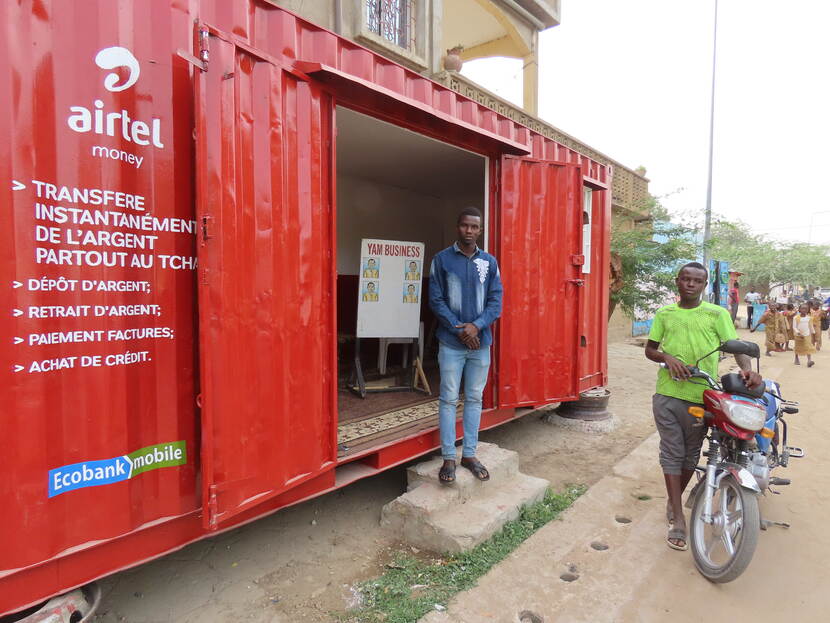
Ambera believes that the growing interest in entrepreneurship among young Chadians is about more than simply finding work. It is also a way for young people to claim a place in society. ‘If you can’t rely on the government,’ he says, ‘you have to make sure you are self-reliant.’
The two young entrepreneurs Madjita and Ousmane both talk with enthusiasm about the confidence they have gained from running their businesses. ‘The most important lesson that entrepreneurship has taught me,’ says Ousmane, ‘is don’t wait, just get on with it!’
Given the demographic trends, it remains to be seen whether startups will prove a sustainable solution to the unemployment crisis. But the interest among young people also reveals something else: they are no longer willing to remain on the sidelines, but want to be actively involved in solving the country’s problems. ‘This adventure has taught me that I myself can help make Chad more prosperous,’ says Madjita proudly.
This article was previously published in 'Vice Versa - Jongerenspecial 2021'
Text: Elian Yahye